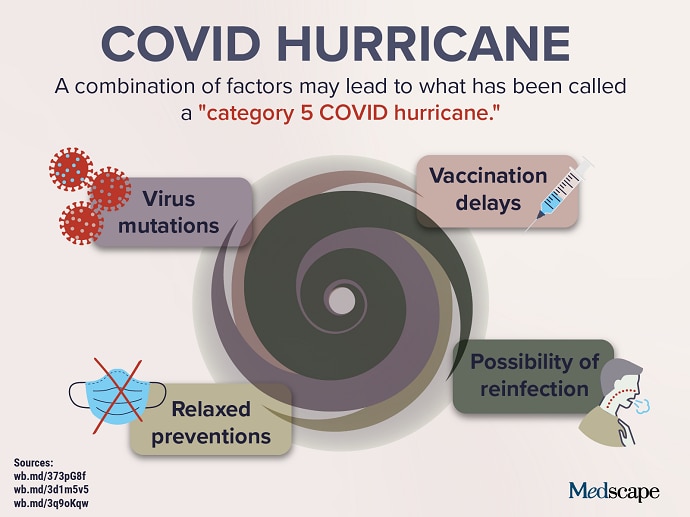Each week, we identify one top search term, speculate about what caused its popularity, and provide an infographic on a related condition. If you have thoughts about what's trending and why, share them with us on Twitter or Facebook. Find the latest COVID-19 news and guidance in Medscape's Coronavirus Resource Center.
Michael Osterholm, director of the Center for Infectious Disease Research and Policy at the University of Minnesota, recently went on NBC's Meet the Press and told host Chuck Todd that he believes that the COVID-19 pandemic is about to worsen in unprecedented fashion. Pointing to the rise in cases associated with variant strains of coronavirus, he predicted that a "hurricane is coming." Describing it as "category 5 or higher," Osterholm used the analogy to urge a dramatic increase in vaccination efforts. The so-called "COVID hurricane" may be fueled by various factors (see Infographic below) and is this week's top trending clinical topic.
Atop the list of causes for an oncoming storm is a rise in coronavirus mutations. The B.1.1.7 variant, first identified in the United Kingdom, is becoming the dominant strain in many European countries and is doubling every 10 days in the United States. Its transmission rate is 30%-40% higher than that of more common lineages, and it may increase the risk for death by about 30%. The B.1.351 variant that emerged out of South Africa has also been reported in various countries, including England, without known links to travel. Brazil has identified two variants, P.1 and P.2. The P.1 variant has been detected in the United States, Germany, the Faroe Islands, and elsewhere.
The response of various vaccines to these new forms of the coronavirus is a concern. For example, the Johnson & Johnson vaccine demonstrated only 57% overall efficacy in South Africa against moderate to severe SARS-CoV-2 infection. Novavax reported an efficacy rate of 49.4% from a clinical trial conducted in South Africa, compared with 89.3% seen in a UK study. Whether the vaccines will struggle as new mutations emerge, such as the one recently identified in Bristol, is part of the potential "hurricane" on the horizon.
Beating back the "category 5" storm will require more rapid vaccine administration and better genomic surveillance, according to experts. It will also take transmission mitigation strategies that have been recommended since the pandemic began. The use of better masks worn appropriately, adherence to physical distancing, and limiting indoor time among persons who don't live together remain the keys to prevention. As the pandemic enters its second year, some fear that fatigue is leading to relaxed responses.
A big unknown is how much reinfections may be a factor. Although fewer than 50 cases of reinfection have been substantiated worldwide, according to a global reinfection tracker, many agencies are not rigorously investigating suspected cases of reinfection. These cases need to be differentiated from so-called long-haul COVID or long COVID, which are infections that linger for months. The fear is that coronavirus mutations may lead to increased reinfections, which has not been well documented to this point. Still, experts say that it is important to get ahead of such a circumstance.
"COVID hurricane" is a term used to encompass the constellation of various elements that may lead to a worrisome turn in the pandemic. It became this week's top trending clinical topic as concerns about what may be on the horizon continue to rise.
Medscape © 2021 WebMD, LLC
Any views expressed above are the author's own and do not necessarily reflect the views of WebMD or Medscape.
Cite this: Ryan Syrek. Trending Clinical Topic: COVID Hurricane - Medscape - Feb 19, 2021.








Comments